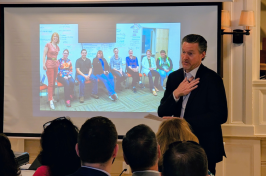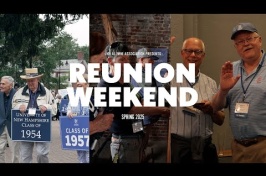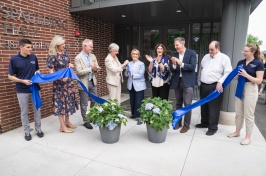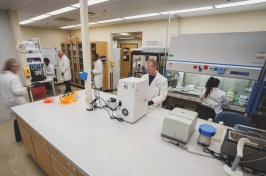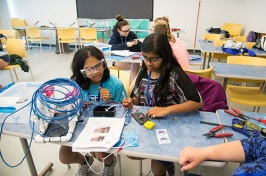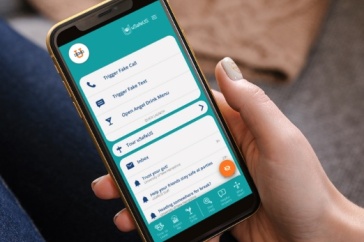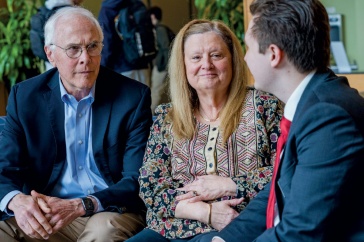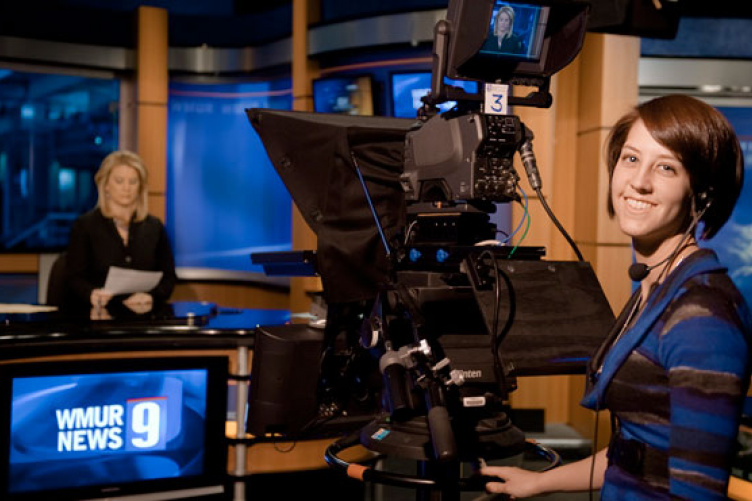
UNH Manchester communications arts major Mollie Markins interns in the production department at WMUR News 9 studios in Manchester. Here, Mollie works a stage camera while news anchor woman, Jennifer Vaughn, prepares for a news bulletin update.
Mollie Markins, a UNH Manchester junior majoring in communication arts, dreams of producing feature stories for television magazines such as “Chronicle” on WMUR-TV. She has taken the requisite courses – from scriptwriting, to video production, to journalism. And, with her faculty mentor, Dana Myskowski, she participated in an independent film competition.
This spring, she completed her career prep trifecta by winning a prized internship with WMUR-TV in Manchester.
This year, scores of student interns like Markins are helping dozens of organizations throughout the Merrimack Valley region with their energy and talent. Collectively, they’ve logged in some 42,000 hours of service, says Donna McIntire, the internship coordinator for UNH Manchester.
Internship sites comprise both a “who’s who” of area organizations – i.e., Velcro, BAE Systems, American Cancer Society, Manchester Central High School – and a “who’s that?” of lesser-known firms as well.
Yet, at a time when organizations of every stripe are seeking new skill sets to meet changing markets and technology needs, these are win-win partnerships for students and company alike.
On the morning of her first day on the job, Markins recalls being so excited that she calmly excused herself, went into the bathroom, checked to be sure she was alone, and then “jumped up and down like a maniac with joy!”
After composing herself, she coolly emerged and began what would become a regular gig working Tuesdays from 4:30 a.m. to 1 p.m. and Thursdays from 3 p.m. to midnight. Although you won’t see her on the set of the morning and evening news hours, she’s there, behind one of three cameras, as the anchors engage in a bit of “live” joshing or devote themselves to recounting the day’s events.
In this kind of classroom, there’s no place to hide. “The studios are much smaller than they seem,” says Markins, pointing to the set of the “Cooks Corner” show, its fireplace setting and weather pod each occupying its own little piece of real estate.
With a director, three cameras, and small handful of technical staff on hand for each broadcast, there is absolutely no excess baggage among the crew. “I thought it would involve more people,” admits Markins, who grew up in Salem, N.H. “Although I’m supervised, they don’t stand there and tell you everything you should do. It’s up to you to watch and learn and ask questions as you go along,” says Markins.
In such a setting, everyone must be ready for anything. “Once, the power went out in the station and the anchors continued to read the news in the dark, the sound of their voices still carrying live,” marvels Markins. Seconds later, a crew member fixed the problem and viewers who had left the room to grab a snack would be none the wiser.
Markins says when she’s not behind the camera, she works on the teleprompter, audio board, and other areas of production. Although she hasn’t had a chance to produce anything herself yet, Markins may get her chance. The station offered her a steady freelance position for the spring that will carry forward once she graduates.
The Right Fit
Not every internship – or even most – result in an offer of fulltime employment.
Lisa Nute, the IT director for the town of Hudson, N.H., oversees the IT and telecommunications needs of 200 public employees, including her community’s police and fire departments. With only two staff members, she counts on a regular flow of UNH Manchester interns every year to tackle special projects.
“This year, I interviewed two students, Jonathan Schultz and Mike Tierney, both CIS majors, and couldn’t choose because they were strong in different areas,” says Nute.
The solution? Nute hired both as interns.
To date, Schultz and Tierney have done everything from routine activities such as upgrading hardware and software and installing virtual servers, to getting inside police cruisers to upgrade criminal databases, to fixing a glitch in the firehouse’s dispatch center.
Nute’s intuition about hiring both students has proven right, with Tierney interested in web design and development, and Schultz more focused on taking a “help desk approach to things,” Nute says. As a little perk for jobs well done, Nute introduced the two to the intriguing field of computer forensics.
The experience impressed Schultz. “There are terms in computer forensics that we use,” says Nashua-bred Schultz. “‘White Hat’ hackers are the ones who break into computers for good reasons, while ‘Black Hats’ do it for bad reasons. We learned what the White Hats do. It was cool to use my knowledge to help people.”
Schultz is considering a career in law enforcement.
Like Nute, Phil Amato often employs interns for special projects. Amato is the operations manager of Teledyne/D.G. O’Brien, a $36 million engineering firm in Seabrook, N.H. that makes electrical connection systems for on submarines, offshore rigs, and other “hostile environments.”
Amato takes pride in helping to “educate the next generation of engineers” by assigning students to projects he couldn’t “devote full-time engineers on,” such as searching out better ways to test or design machines or processes that aren’t performing up to snuff.
“We lay out expectations of what they should do. We’re not going to do it for them,” avers Amato. What happens next is largely up to the student. While the company has had to part ways with the odd intern who doesn’t work out, the vast majority contributes handsomely to their projects. More than a few are permanently hired.
McIntire says that while internships at UNH Manchester are on the rise, the end is nowhere in sight. “The futures of UNH Manchester and our region’s economy are inseparable. We anticipate that this experience will be become even more basic to our mission than ever before.”
-
Written By:
Dave Moore | UNH Cooperative Extension








